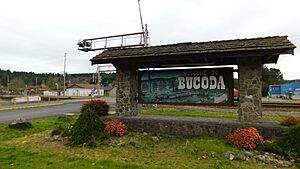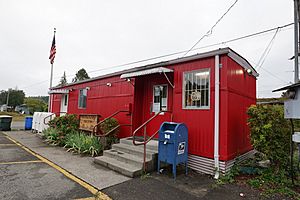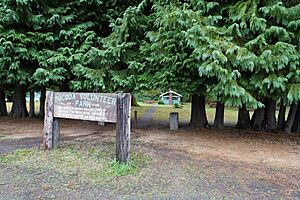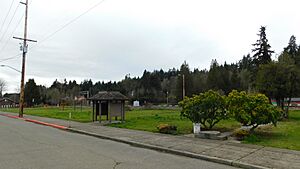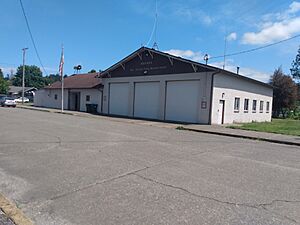Bucoda, Washington facts for kids
Quick facts for kids
Bucoda, Washington
|
|
|---|---|
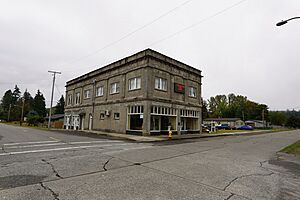
Town hall
|
|
| Nickname(s):
World's Tiniest Town with the Biggest Halloween Spirit
|
|
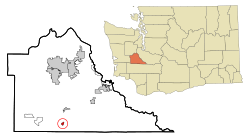
Location of Bucoda, Washington
|
|
| Country | United States |
| State | Washington |
| County | Thurston |
| Area | |
| • Total | 0.60 sq mi (1.56 km2) |
| • Land | 0.58 sq mi (1.51 km2) |
| • Water | 0.02 sq mi (0.05 km2) |
| Elevation | 246 ft (75 m) |
| Population
(2020)
|
|
| • Total | 600 |
| • Estimate
(2021)
|
598 |
| • Density | 1,015.44/sq mi (392.40/km2) |
| Time zone | UTC-8 (PST) |
| • Summer (DST) | UTC-7 (PDT) |
| ZIP code |
98530
|
| Area code | 360 |
| FIPS code | 53-08605 |
| GNIS feature ID | 2411738 |
Bucoda is a small town in Thurston County, Washington, United States. In 2020, about 600 people lived there. The town is famous for calling itself the "World's Tiniest Town with the Biggest Halloween Spirit."
Contents
What's in a Name? The Story of Bucoda
The area was first known by an old word, Seatco. This word meant "evil spirit" or "devil." In 1887, a founder named Oliver Shead officially planned the town. But people didn't like the name. So, in 1890, the state government changed it to Bucoda.
One popular idea for the name Bucoda is that it comes from parts of three early town leaders' last names:
- Buckley (or Buckner)
- Coulter
- Davis (or David)
A Look Back: Bucoda's History
The first American settler in Bucoda was Aaron Webster, who arrived in 1854. Later, in the 1860s, he sold his land and sawmill to Oliver Shead. The Northern Pacific Railroad built a station here in 1872. In December 1887, a big flood hit the area, affecting rivers like the Skookumchuck and Chehalis.
In the 1880s, people tried to mine coal nearby, but the coal wasn't very good, so mining stopped and started often.
From 1874 or 1878, Bucoda was home to Washington's first prison. It was a three-story wooden building. The prison was known for being a tough place. People held there had to do hard and dangerous work for local businesses. The prison was supposed to close in 1888. It was last used in 1890 and officially shut down when the state opened a new prison in Walla Walla, Washington.
Bucoda officially became a town on June 7, 1910. Emil Krupp was its first mayor. The town once had a water tower, but it was taken down in the early 1980s. There was also a very busy lumber mill called Mutual Lumber Mill. It was so successful that Bucoda was once called the "Town with the Million Dollar Payroll." The mill burned down, was rebuilt, but then burned down again.
In January 2025, a new law was signed to rename the town's post office. It is now called the Mayor Rob Gordon Post Office. Mayor Gordon had lived in Bucoda for a long time. He worked in the fire department and on the town council before he passed away.
Bucoda's Location and Size
Bucoda is a small town. It covers about 0.59 square miles (1.53 square kilometers). Most of this area is land, with a small part being water.
Who Lives in Bucoda?
The town's population changes over time. Here's a quick look at how many people have lived in Bucoda:
| Historical population | |||
|---|---|---|---|
| Census | Pop. | %± | |
| 1890 | 945 | — | |
| 1920 | 442 | — | |
| 1930 | 703 | 59.0% | |
| 1940 | 541 | −23.0% | |
| 1950 | 473 | −12.6% | |
| 1960 | 390 | −17.5% | |
| 1970 | 421 | 7.9% | |
| 1980 | 519 | 23.3% | |
| 1990 | 536 | 3.3% | |
| 2000 | 628 | 17.2% | |
| 2010 | 562 | −10.5% | |
| 2020 | 600 | 6.8% | |
| 2021 (est.) | 598 | 6.4% | |
| U.S. Decennial Census 2020 Census |
|||
Bucoda's People in 2010
In 2010, there were 562 people living in Bucoda. There were 222 homes, and 148 of them were families. Most people (91.6%) were White. About 5.7% of the population was Hispanic or Latino.
The average age in Bucoda was about 40 years old. About 20% of the people were under 18. About 13% were 65 or older. There were slightly more males (51.1%) than females (48.9%).
Fun and Culture in Bucoda
Since 2009, Bucoda has been known as "Boo-coda" every October. This is because of its month-long Halloween celebrations! The event is famous for its Scary Nights Haunted House and parades of hearses (special cars used in funerals).
Parks and Outdoor Fun
The South Sound Speedway is a racetrack located northwest of downtown Bucoda. Here, you can watch exciting Figure 8 races.
Bucoda in Media
Bucoda, Washington, is the setting for an episode of the horror podcast The Magnus Archives. The episode is called "We All Ignore the Pit." Also, a small part of the independent movie The Mountain, starring Jeff Goldblum, was filmed at a restaurant in Bucoda.
Getting Around Bucoda
Bucoda has a free bus service called ruralTRANSIT. It's provided by the Thurston Regional Planning Council. This bus service started in the mid-2000s. It helps people get to other bus systems like Intercity Transit and Lewis County Transit.
See also
 In Spanish: Bucoda (Washington) para niños
In Spanish: Bucoda (Washington) para niños


